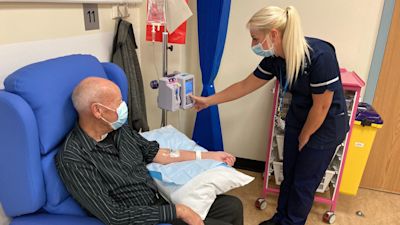Multi-million pound plan to meet North East's growing demand for medicines

A new drugs production hub will be built in the North East to safeguard the supply of medicines at a time of growing demand.
The hub will prepare injectable medications including chemotherapy and the nutrition given to patients who need help with feeding.
The project, which is costing £30m, is a joint venture between hospitals across the region and aims to protect supplies of injectable drugs for the next two decades.
At the moment, many of these treatments are prepared within hospitals themselves, in tightly controlled, clean areas called aseptic units.
From there, the drugs are taken onto the hospitals' wards and cancer units where they are administered to patients.
Many of the hospital aseptic units are running at full capacity, which is why the NHS wants to create the regional production facility.
According to the Chief Executive of South Tyneside and Sunderland NHS Foundation Trust, Ken Bremner, the new development will safeguard supplies at a time when treatments and techniques are becoming ever more specialised.
He told us: "Patients are going to get the drugs they need - full stop - and it will also enable us to look ahead to what's coming and to manage it at a scale that we haven't seen hitherto, particularly when you get into the more specialist, complex cancer treatments and drugs."
In figures:
Four million doses of injectable medicines are prepared across the North East and North Cumbria health region every year.
Building the region-wide 'aseptic hub' will cost almost £30m with the money coming from the NHS nationally.
The plan is aimed at securing the supply of injectable medicines for the next twenty years.
Source: North East and North Cumbria NHS Provider Collaborative
Those behind the hub scheme argue it will bring other benefits too.
Ward nursing staff are responsible for making up many of the other injectable medicines used in hospitals, including antibiotics.
Specialist pharmacist Anne Black explained that this time consuming process would also be taken on by the new hub.
She said: "If we take antibiotics as an example of an injectable medicine that's required, it can take up to twenty minutes to prepare one dose so it's then ready to be connected to the patient.
She continued: "If we've got seven or eight patients on a ward, all on a similar antibiotic then essentially what we're doing is taking a day out of nursing time.
"Providing it from the hub will mean there'll be a lot more time for face to face care."
The development will be based at Seaton Delaval in south east Northumberland, on the same site as a factory which makes personal protective equipment for health workers.
It was established by the NHS during the pandemic in a bid to make the region more self sufficient in PPE.
Once up and running, the drugs hub would do much the same for injectable medicines.
Those behind the plan are keen to stress it is designed to boost overall production, and would not replace aseptic units in individual hospitals, which would continue to operate.